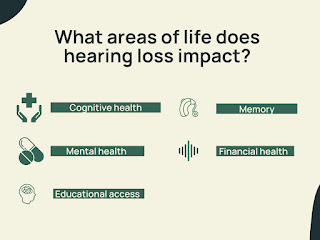As we journey through retirement years, it's not just the memories that become a bit hazy; sometimes, it's our hearing too. Hearing loss is one of those sneaky little things that creeps up on us, often without us even realizing it. We talked briefly about some of this before and you can read that blog post here in case you missed it.
But here's the thing: hearing loss isn't just about asking people to repeat themselves or turning up the TV volume. It's much more than that. It's about how staying connected to the world around us can actually help us live longer, healthier lives.
You see, when our hearing starts to fade, we might not notice the birds chirping on a sunny morning or the laughter of our grandchildren playing in the backyard. But it's not just these beautiful sounds we miss out on; we might also start withdrawing from conversations, feeling a bit left out at family gatherings, or avoiding social situations altogether because it's just too hard to keep up.
This withdrawal can lead to feelings of loneliness and isolation, which, believe it or not, are as harmful to our health as smoking or obesity. Studies have shown that social isolation can lead to a higher risk of serious health issues like heart disease, depression, and even dementia. It's like a domino effect; one thing leads to another, and before we know it, our overall health starts to decline.
But here's the good news: it doesn't have to be this way. Hearing aids can be real game-changers. I know, I know – you might be thinking, "Hearing aids? Aren't those for... well, old people?" But let's face it, we're all young at heart, and embracing a tool that can keep us engaged and active is actually a pretty youthful thing to do.
Modern hearing aids are nothing like the bulky, whistling devices of the past. They're sleek, discreet, and, in some cases, virtually invisible. They can be tailored to your specific hearing needs, ensuring that you don't miss out on the punchline of a joke or the important announcements at your granddaughter's graduation.
But the real magic of hearing aids lies in how they can help us maintain our connections with the world around us. They allow us to participate in conversations, enjoy social gatherings, and stay engaged with our loved ones. This engagement is crucial for our mental and emotional well-being, keeping us sharp, happy and connected.
In fact, studies have shown that people with hearing loss who use hearing aids have a lower risk of cognitive decline and dementia. They're also more likely to stay physically active and socially engaged – two key ingredients for a long and fulfilling life.
So, if you've noticed that your hearing isn't quite what it used to be, consider getting it checked out. Think of hearing aids not as a sign of aging, but as a badge of honor – a tool that empowers you to stay connected, active, and fully immersed in the joys of life.
Remember, every sound, every conversation, every laugh we share adds a little something to our lives. Let's make sure we're not missing out on any of it. Here's to living our best lives, with all the sounds and joys it has to offer!
Here are some resource articles you might want to read over:
But here's the good news: it doesn't have to be this way. Hearing aids can be real game-changers. I know, I know – you might be thinking, "Hearing aids? Aren't those for... well, old people?" But let's face it, we're all young at heart, and embracing a tool that can keep us engaged and active is actually a pretty youthful thing to do.
Modern hearing aids are nothing like the bulky, whistling devices of the past. They're sleek, discreet, and, in some cases, virtually invisible. They can be tailored to your specific hearing needs, ensuring that you don't miss out on the punchline of a joke or the important announcements at your granddaughter's graduation.
But the real magic of hearing aids lies in how they can help us maintain our connections with the world around us. They allow us to participate in conversations, enjoy social gatherings, and stay engaged with our loved ones. This engagement is crucial for our mental and emotional well-being, keeping us sharp, happy and connected.
In fact, studies have shown that people with hearing loss who use hearing aids have a lower risk of cognitive decline and dementia. They're also more likely to stay physically active and socially engaged – two key ingredients for a long and fulfilling life.
So, if you've noticed that your hearing isn't quite what it used to be, consider getting it checked out. Think of hearing aids not as a sign of aging, but as a badge of honor – a tool that empowers you to stay connected, active, and fully immersed in the joys of life.
Remember, every sound, every conversation, every laugh we share adds a little something to our lives. Let's make sure we're not missing out on any of it. Here's to living our best lives, with all the sounds and joys it has to offer!















